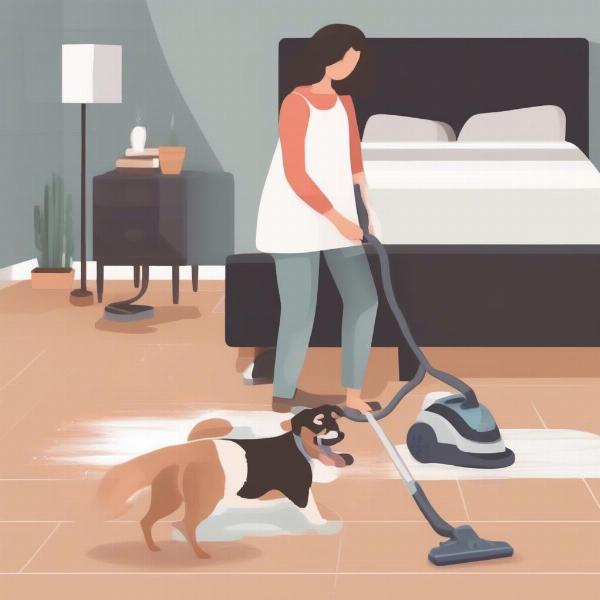Finding the best flea control for your dog can feel overwhelming with so many options available. This guide will help you navigate the various types of flea treatments, understand their effectiveness, and choose the safest and most effective solution for your furry friend. We’ll cover everything from topical treatments to oral medications, natural remedies, and preventive measures to keep your dog flea-free.
Understanding Flea Infestations in Dogs
Before diving into treatment options, it’s essential to understand how fleas affect dogs. Fleas are tiny, wingless parasites that feed on the blood of mammals. They can cause intense itching, skin irritation, and even allergic reactions in dogs. In severe cases, fleas can transmit diseases and cause anemia. Recognizing the signs of a flea infestation is crucial for prompt treatment. Common symptoms include excessive scratching, biting, hair loss, and small black specks (flea dirt) on your dog’s fur.
Types of Flea Control for Dogs
Several effective flea control methods are available for dogs, each with its advantages and disadvantages.
Topical Flea Treatments
Topical treatments are applied directly to your dog’s skin, usually on the back of the neck. These products typically contain insecticides that kill adult fleas and sometimes prevent flea eggs and larvae from developing. Popular options include Frontline, Advantage, and Revolution.
Oral Flea Medications
Oral flea medications are pills or chewable tablets that kill adult fleas quickly. These medications are generally safe and effective, but it’s essential to choose a product specifically formulated for dogs. Common oral flea medications include NexGard, Bravecto, and Simparica.
Flea Collars
Flea collars release insecticide over time, killing and repelling fleas. Some collars also offer protection against ticks and other parasites. Seresto and Preventic are popular flea collar brands.
Natural Flea Control Remedies
For pet owners seeking natural alternatives, several remedies can help control fleas. These include essential oils like lavender and cedarwood, diatomaceous earth, and apple cider vinegar. However, it’s important to note that the effectiveness of natural remedies can vary, and some may not be suitable for all dogs. Consult your veterinarian before using any natural flea control methods.
Choosing the Best Flea Control for Your Dog
Selecting the right flea control for your dog depends on several factors, including your dog’s age, size, breed, lifestyle, and the severity of the infestation. what is the best flea control for dogs Always consult with your veterinarian to determine the best course of action. They can assess your dog’s individual needs and recommend the most appropriate and safe treatment option. flea tick and worm treatment for dogs 3 monthly Remember to follow the product instructions carefully and monitor your dog for any adverse reactions.
Preventing Flea Infestations
Preventing flea infestations is often easier and less costly than treating them. Regular grooming, vacuuming your home frequently, washing your dog’s bedding, and using flea preventatives year-round can significantly reduce the risk of infestations. allergy test for dogs
 Preventing flea infestations in dogs
Preventing flea infestations in dogs
Conclusion
Finding the best flea control for your dog requires careful consideration of various factors. By understanding the different treatment options available and working closely with your veterinarian, you can effectively protect your furry companion from these pesky parasites. Remember, prevention is key to keeping your dog flea-free and healthy. Consider a proactive approach to flea control, and don’t hesitate to consult your veterinarian if you have any concerns.
FAQ
- How often should I treat my dog for fleas? This depends on the product and your dog’s individual needs. Consult your veterinarian for specific recommendations.
- Can I use cat flea products on my dog? No, never use cat flea products on dogs, as they can be toxic.
- Are there any side effects of flea treatments? Some dogs may experience mild side effects, such as temporary skin irritation or gastrointestinal upset. If you notice any concerning symptoms, contact your veterinarian.
- What should I do if my dog has a severe flea infestation? Consult your veterinarian immediately for appropriate treatment and management.
- How can I prevent fleas in my home? Regular vacuuming, washing pet bedding, and using flea preventative products can help prevent infestations.
- Can fleas transmit diseases to humans? Yes, fleas can transmit diseases to humans, although this is less common.
- Are natural flea remedies as effective as chemical treatments? The effectiveness of natural remedies can vary. Consult your veterinarian before using them.
ILM Dog is a leading international pet website dedicated to providing expert advice on dog care and wellbeing. We cover a wide range of topics, from breed selection and health care to training, nutrition, grooming, and much more. Whether you’re a new dog owner or a seasoned pro, ILM Dog offers valuable resources and practical tips to help you provide the best possible care for your canine companion. dog licks pussey simparica trio for dogs reviews For expert advice on dog health, training, nutrition, and more, contact ILM Dog at [email protected] or +44 20-3965-8624. Visit us at ILM Dog today!